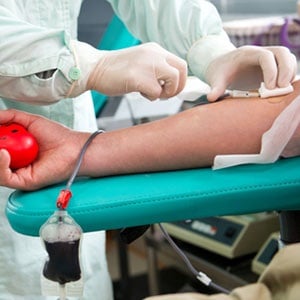
A blood transfusion can be a life saving treatment for patients with cancer, patients undergoing surgery, children with severe anaemia, women who have complications with their pregnancy, and accident victims.
If you're still in two minds about whether you should donate blood, consider that doing so not only helps others, you are doing something for your health!
How much and how often?
By law, you may only donate about 480 ml. of blood every 56 days, to ensure that you've had enough time to replenish the red cells from your last donation.
The body replaces all of its lost blood volume within 48 hours after donating blood; the replenishment of red blood cells takes a little more time, about four to eight weeks worth.
Though the waiting period may be a bit long, the altruistic feeling of donating blood every two to three months can often be reward enough to make the wait and donation worthwhile.
Additionally, the positive feelings associated with blood donation have been shown to improve both emotional and physical health.
Read: Why I am a blood donor
So what are the health benefits?
According to studies published in the American Journal of Epidemiology, blood donors are 33 percent less likely to suffer a cardiovascular disease and 88 percent less likely to suffer a heart attack.
The two main theories researchers why blood donors have lower health risks:
The first theory is that people who wish to donate blood are already healthy. A blood donor must be deemed healthy before donating blood.
In order to determine this, a series of free physicals are performed on the donor to verify the donor’s health status. As a result, approved blood donors are already less likely to suffer health and cardiovascular diseases.
The second theory is that the lowered health risks have to do with iron depletion. Iron has a significant impact on the body.
High blood iron can cause a variety of symptoms, such as irregular heartbeats, lethargy, muscle weakness, hardening of arteries, accelerated cholesterol oxidation, decreased libido and enlarged liver, to name a few.
When donating blood, you are removing 225 to 250 mg of iron from your body; therefore reducing your risks of health complications.
In fact, a four-and-a-half-year study found that those who donated blood biannually had reduced their risk of cancer and mortality compared to those who didn't, simply because of decreased iron levels.
Read: More South Africans are urged to donate blood
Blood donation has also been found to help those wishing to lose weight. A person who donates blood burns about 650 calories with every pint donated, as the body has to work to replenish itself.
Though there are many benefits to donating blood just one time, the people who benefit most from blood donations are regular donors.
According to a study published in the Journal of American Medical Association, researchers found that those between the ages of 43 and 61 had fewer heart attacks and strokes when they had donated blood every six months.
Another study done by the Miller-Keystone Blood Center in the US found that consistent blood donation is associated with lower risks of cancer diagnosis; risk levels of being diagnosed with any type of cancer decreased in correlation with how often donors donated blood.
Read more:
Peanut-eating blood donors spark allergic reaction
Six top excuses for not donating blood
World Blood Donor Day - highlighting the issue
Sources: Daily Mail, One Blood, Tibet Charity and Livestrong




 Publications
Publications
 Partners
Partners









